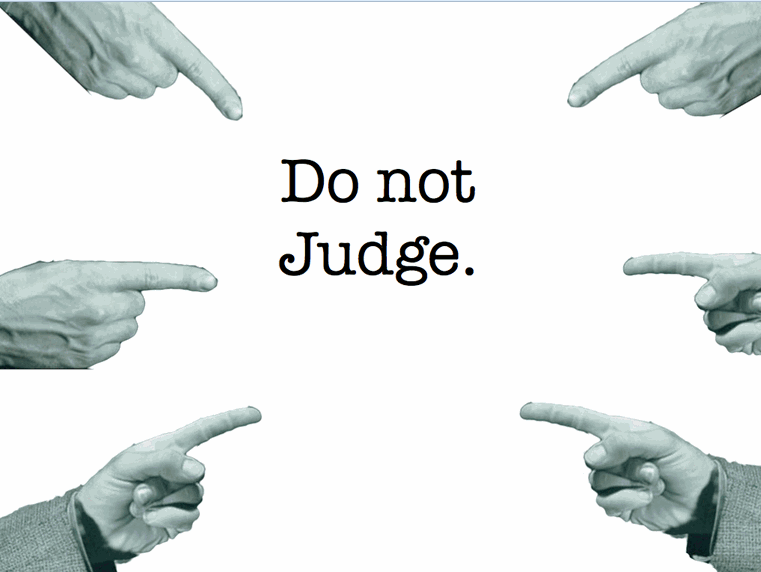DO NOT JUDGE
The World’s Favorite Bible Verse — What It Really Means
DO NOT JUDGE
The World’s Favorite Bible Verse — What It Really Means
Few phrases have been more quoted and less understood than Jesus’ words in Matthew 7:1:
“Do not judge, or you too will be judged.”
In modern culture, this line has become a shield—used to silence anyone who dares to call sin what it is. But Jesus wasn’t prohibiting discernment. He was warning against hypocrisy, self-righteousness, and the misuse of moral authority.
The Misuse of “Judge Not”
Today, “don’t judge me” often means “don’t tell me I’m wrong.” The world has redefined love as uncritical affirmation and replaced moral clarity with emotional comfort.
Ironically, those who quote “judge not” as an absolute are themselves judging anyone they deem judgmental. It’s a self-refuting slogan—used to condemn judgment itself.
Jesus’ words were never meant to silence moral discernment. They were meant to purify it.
The Text in Context
The Sermon on the Mount (Matthew 5–7) is Jesus’ deep dive into Kingdom ethics. When He says, “Do not judge,” He immediately adds:
“For in the same way you judge others, you will be judged,
and with the measure you use, it will be measured to you.”
(Matthew 7:2, NKJV)
This is not a ban on moral judgment. It’s a warning: the standard you use for others will be used for you.
Then Jesus gives the vivid illustration of the plank and the speck (vv. 3–5):
“Why do you look at the speck in your brother’s eye but fail to notice the plank in your own? … First remove the plank from your own eye, and then you will see clearly to remove the speck from your brother’s eye.”
Notice that Jesus doesn’t say, “Ignore your brother’s speck.” He says, “Deal with your own sin first, then help him.” The issue isn’t judgment—it’s hypocrisy.
Judging Righteously
Elsewhere, Scripture commands righteous judgment.
Jesus says, “Do not judge by appearances, but judge with righteous judgment.” (John 7:24)
Paul calls for moral discipline within the church (1 Corinthians 5).
James praises those who “turn a sinner from the error of his way” (James 5:20).
The Bible never calls for moral blindness—it calls for humble discernment. The difference between sinful judgment and righteous judgment lies in the heart.
Hypocritical judgment condemns to elevate oneself.
Righteous judgment discerns truth to restore others.
The Word “Judge” — What Jesus Actually Said
The Greek word for “judge” here is krino. It can mean anything from to discern to to condemn.
In this passage, Jesus is saying, “Do not take the place of God as judge.” The problem isn’t moral evaluation—it’s spiritual arrogance.
Throughout the New Testament, krino is used positively when referring to wise discernment (Luke 12:57; 1 Corinthians 10:15). Jesus forbids not discernment, but the condemnatory spirit that assumes divine authority.
When Truth Becomes a Weapon
The “plank and speck” parable cuts deep. Human nature magnifies others’ sins while minimizing its own. The Pharisees did this perfectly—meticulous about others’ obedience, blind to their own rebellion.
The Church today is not immune. Some use “truth” as a bludgeon rather than a balm. Sound doctrine without humility becomes spiritual toxicity.
True discernment starts with repentance, not accusation.
Before you correct anyone, you must first stand under the same light of judgment you wish to apply.
Love and Judgment Are Not Enemies
Modern culture believes that love and judgment can’t coexist. But in Scripture, love requires discernment.
Paul exhorts us to “speak the truth in love” (Ephesians 4:15)—not to abandon truth for love or love for truth.
Jesus lived this tension perfectly:
He extended mercy to sinners but never minimized their sin.
He refused to condemn the adulterous woman—but still told her, “Go and sin no more.” (John 8:11)
Love doesn’t affirm sin; it seeks redemption.
To love someone is to care enough to warn them.
The Danger of “Don’t Judge” Christianity
When the Church adopts the world’s version of “don’t judge,” it loses its prophetic voice.
If we can’t call sin what it is, we can’t call salvation what it means. The Gospel makes no sense apart from the reality of sin and judgment.
Silence is not compassion—it’s complicity.
As C. S. Lewis once observed, “We make men without chests and expect of them virtue.” That’s what happens when we remove all moral categories. The result isn’t freedom—it’s confusion.
The Ultimate Judge
The same Jesus who said “Do not judge” also said:
“Many will say to Me in that day, ‘Lord, Lord,’ … and I will declare to them, ‘I never knew you.’” (Matthew 7:22–23)
The Sermon on the Mount ends with a picture of divine judgment.
Jesus is not denying the reality of judgment—He is reminding us who the true Judge is.
When we remember that God alone holds that authority, we approach moral discernment with fear and trembling, humility and grace.
So What Did Jesus Mean?
When Jesus said “Do not judge,” He meant:
Don’t play God.
Don’t condemn others from a place of hypocrisy.
Don’t forget that the measure you use will be used for you.
But He also meant:
Do judge righteously.
Do discern truth from error.
Do correct in humility and love.
It’s not “don’t judge.”
It’s “Judge rightly.”
Final Word
“Do not judge” was never meant to silence truth. It was meant to sanctify it.
Jesus wasn’t commanding compromise—He was calling for purity of heart.
Before you correct another, examine yourself.
Before you condemn, remember grace.
Before you stay silent, remember: silence is not love.
The standard you use will be used for you.
That truth should make us humble, not hesitant.
Robert Rousseau
Candlefish Ministries
✦ If this teaching resonated, share it with someone wrestling with truth and grace.
✦ Speak truth—but speak it clean, speak it kind, speak it bold.





I have given this message nearly word for word to the addicts I’ve counseled for many years. It has often helped them to overcome the self-righteous, hypocritical passing of judgment by others upon them…which is one notable reason they continue to cope with substances to avoid these beliefs they have come to have for themselves. It also opens the door to allow them to find a healthy and critical way to look at themselves to find what “specks” and “planks” they need to work on within them selves that keeps causing them problems and dishonoring their Creator. Thank you for this writing Mr. Rousseau!
The world today calls us to not only approve of sin but to embrace it. We should not remain silent, but be discerning it how we address this. Thanks for this insightful post.